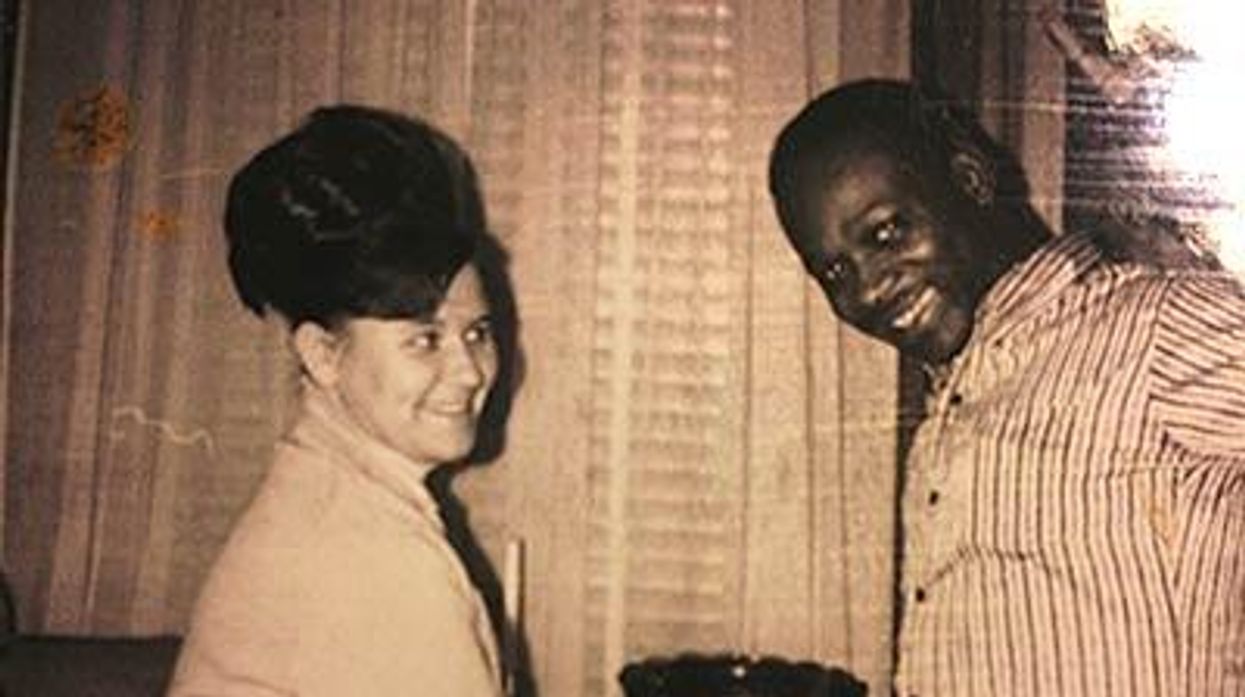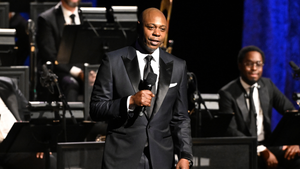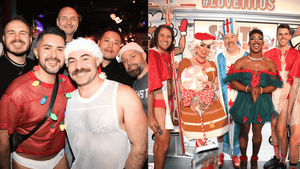All Rights reserved
By continuing to use our site, you agree to our Privacy Policy and Terms of Use.
Your support makes The Advocate's original LGBTQ+ reporting possible. Become a member today to help us continue this work.
My father used to tell me how he had to wait years for his marriage to be accepted in every state, but he didn't say it with pity. He said it with pride because he had to fight for it. You see, he got married in 1961, six years before the Loving v. Virginia ruling was handed down by the Supreme Court, making it legal for all interracial couples to get married. Just straight couples, of course, could tie the knot in every state legally, but hey, it was a step in the right direction.
My parents -- a black man from California and a white woman from Liverpool -- had a party to celebrate their freedom that weekend the Supreme Court decided. They were free to go where they wanted and not be afraid they would be turned away simply for loving each other. When they married, only 24 states recognized their marriage. They even had to battle the military to get "permission" to get married. They met in England in 1959 and, like many G.I.s and British women, they fell in love and wanted to be together, to make a family. They just wanted to be like thousands of other G.I.s who wanted to get married and have families. But it wasn't that simple. In more than half the states back home in the U.S., their marriage was against the law.
You could say some in the military were not that supportive of my parents starting a life together as a married man and woman. As a matter of fact, some of my father's superiors went above and beyond the call of duty to try to dissuade them. After being called in to meetings with some of his superiors who spent hours trying to get him to change his mind, often questioning my mother's motives, my father stuck by the side of the woman he loved, and the military eventually gave in, having no choice but to allow them to marry. None of the derogatory words or the threats that were lobbed at my mother and father during these meetings would change their minds. They loved each other and wanted to get married like their other friends.
My parents were called into the offices of my dad's bosses, where my mother was called a whore and threatened with not being able to get a visa to travel to the U.S. with my father. They tried to wear my father down with ultimatums, but once his superiors realized this tactic would not work, after months of this pressure, they were told they could marry but our family could never be stationed at any base in any state where "miscegenation" was against the law.
Quickly, my father hopped on the phone to my mother, instructing her to grab her wedding dress, which had been hanging in her closet for months. He wanted to get to the registrar's office before the military "powers that be" changed their minds.
That afternoon, they got my mother's family together, and stood before the preacher, God, and a handful of friends and committed themselves to each other, regardless of the law in some states. Their commitment was as strong the day my father died as it was the day they tied the knot. They knew they faced an uphill battle, but they would be doing it together. The lack of a unified law did not scare them off.
We could not live in any of the states that did not recognize their marriage, like Texas or Arizona. My dad said there were plenty of other places that would accept him, his white wife, and biracial child. We were eventually sent to California, and I quickly came along, followed 14 months later by my sister and 14 more months later by my brother.
Our interracial family (in which we all looked different from each other) sort of stood out on the base -- as we kept being born, we got lighter and our hair got straighter. My younger brother could easily have passed for white, but not the rest of us. Some people even called us names, usually when we were just with my mother, but it didn't bother us. We lived in a house where we knew our parents really wanted us and were even willing to break the law to have us. How many people could say that? We sort of lived in this cocoon; at least while we lived on that base in California.
Then in 1967 everything changed. The Supreme Court said my parents' marriage had to be recognized, and we were no longer "bastards," as some had called us. We were legal, everywhere. I was a child, and while I recognized my parents were whooping and hollering and kissing, at that point in my life, little did I know that fighting for marriage equality was far from over for me. The fight was ingrained in me.
Some 46 years later I found myself facing the same challenges my parents had faced when I decided to marry the woman of my dreams. In 2010, when I finally convinced Robin to marry me, same-sex marriage was still only legal in a handful of states. So many people told us not to do it -- it wasn't worth the trouble, and our marriage would never be recognized, not in our lifetime. Sound familiar? Robin had even refused my marriage proposals several times because she said she didn't want to get married until all states would recognize it.

It wasn't until I had to have a life-threatening surgery when she finally gave in, married me, and wiped away my sloppy tears as the minister conducted our ceremony on the beach in Provincetown, Mass., in one of the few states that would recognize my marriage at the time.
I knew this was important to me, but I didn't realize how emotional I would get until we signed our marriage license application. I realized this was how my parents felt, signing that paper. They knew that not everyone would recognize their marriage, but they recognized their union, and that's all that counted. It didn't matter whether our marriage was valid to just the two of us or the 300 million people in the country. I just wanted to be married to Robin, and I didn't care what the courts, lawmakers, voters or anyone else had to say about it. I knew that in Massachusetts, I was "legal," and I was going to be legally married somewhere.
I felt my parents by my side even though they were not physically there as the wedding day arrived. I stood with Robin, the minister, and two new friends as we said the heartfelt vows that summed up what we felt in the past, what we felt in that moment, and what we were sure to feel in the future when the entire world would recognize the committed union that our friends and family recognized.
Robin and I are lucky. We came home from our wedding to another acknowledgement of our love when we drove down the street and saw that our neighbors had decorated our house. Before Pete and June knew us, they did not have friends who were gay, but after getting to know us as just "regular" people, they knew how important it was that we come home to Arizona, a state that did not recognize same-sex marriage, and let us know they were with us. Heck, they let the entire neighborhood know! And it didn't stop there. Two other friends, Mark and Val, asked if they could throw us a wedding party. We have incredibly supportive family and friends, and we are just waiting for the day when they get to celebrate our "full-fledged marriage" with us, and not in just the 30-odd states where marriage equality is recognized.
I could go on about the many legal reasons the Arizona decision is so important, but as dozens of states now must recognize the marriages of all their citizens -- a day I was afraid I would never see -- I spent time thanking my family and friends for their support, and Robin, who has endured tough times by my side, and the many people who I don't know, but who have fought to give Robin and I these rights.
But chiefly, I have to thank my mother and father, who taught me that if your love is strong enough, it will be strong enough to survive all the hurtful words, and looks and comments over the years. They taught me that a simple act can be a stand for everyone who came after. They especially taught all us kids that while some people might not always agree with everything you say, most people are still good. People will amaze you at times when they occasionally and surprisingly stand up for you, which is why we must remember to stand up for those who might not be able to stand up alone.
So I say thank you to all the people before me who have fought for the basic right to be married, and those who will come after me and will continue to fight for others. I have found that love is indeed enough to see you through the tough times. Compassionate love will help those who might not agree with these decisions to remember we are people with hearts and feelings; if you can't support us, at least respect the idea that we love each other as much as you might love the person you are with.
I thank the courts that affirm the idea that all people are created equal. While I wish that the voters of Arizona had had another chance to make this decision, I am happy that the court at least has seen that here in Arizona, Robin and I are like any other married couple.
I stand tall and will continue to stand tall with all the supporters of equality until the last state falls and recognizes my marriage. Arizona's decision was a reason for me to stand a bit taller, but I can't wait until I get to celebrate like my parents did after Loving v. Virginia in 1967 when the U.S. Supreme Court decided to affirm the marriages of couples across this country, and Mom and Dad had a house party to end all house parties. We will also have a party when same-sex marriage is legal in every state, and as usual, everyone will be invited, or at least as many as we can fit into our home!
SUE GREEN is a former journalist and the broadcast director of Cronkite News Service at Arizona State University. Four years ago she married her partner of 15 years. She first moved to Arizona in 1979.



































































Charlie Kirk DID say stoning gay people was the 'perfect law' — and these other heinous quotes